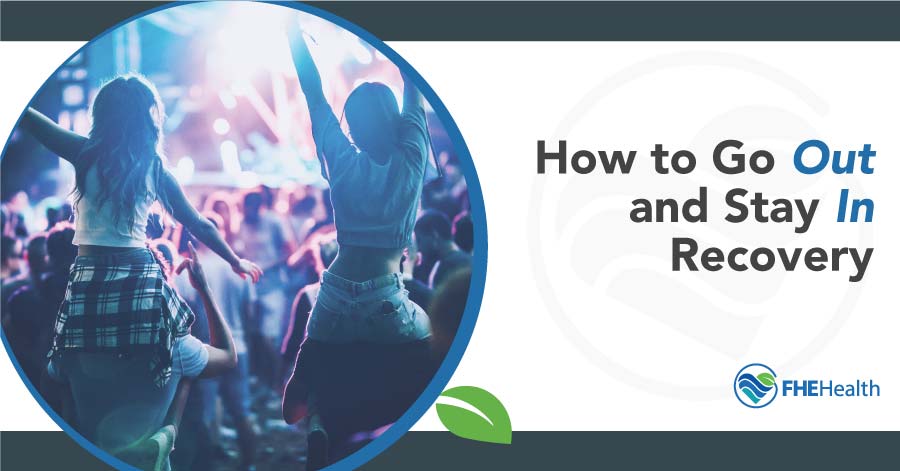
Early recovery from addiction will take some drastic life changes, and you’ll likely still feel those familiar urges to go out with friends “just like old times.” In recovery, we’re told to be especially careful in social situations, especially those with friends who are still entrenched in your old lifestyle or in situations where substances are readily available.
This can make it difficult to know where to turn when you want to reconnect with people socially. Can you go out like you used to and stay sober? The answer is different for each person, but no matter what, you should be extremely careful. Here’s a breakdown of how to stay the course of your recovery while enjoying your social life.
The Desire to Go Out Is Natural
Think of it this way: Social behavior is a natural part of life, and people facing addiction often think that once they enter recovery, they can’t have fun with friends anymore. Not only is this not true, but it can also be a burden on recovery in general — having reservations about entering rehab can reduce the potential effectiveness of addiction treatment.
So when a friend casually mentions that your buddies from college are getting together or a group of coworkers is meeting up after work to decompress from the week, your instinct may be to lament and refuse, thus shutting off the temptation that might derail your recovery.
To be clear, there’s nothing wrong with this feeling. if you don’t think you can resist the temptation or don’t think a certain social group is a good influence on your sobriety, you shouldn’t reject that feeling in favor of doing something that makes you uncomfortable. Your feelings are valid. With that said, everyone feels the urge to have fun sometimes.
Depending on your recovery journey so far, you should be able to navigate this without making a mistake that can set you back months or even years. Here are some tips to ensure that when you decide to go out, you can make choices that don’t detract from your sobriety.
Come Prepared with a Plan
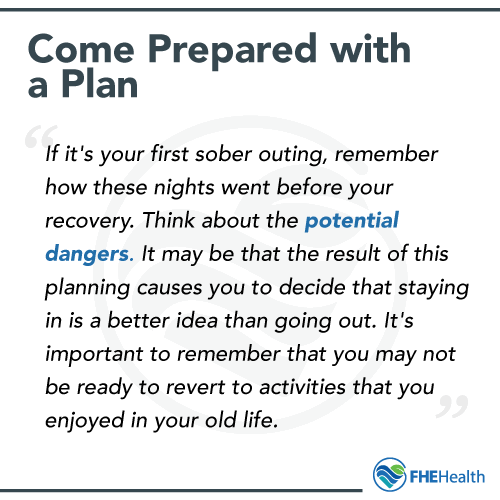 When you’re not sure how a night will go, your best bet is to prepare for every possibility. If it’s not your first sober outing, you’ll have more to recall. Think about how these nights tend to go. Have you ever gotten in trouble before? Think about how you would handle a similar situation now.
When you’re not sure how a night will go, your best bet is to prepare for every possibility. If it’s not your first sober outing, you’ll have more to recall. Think about how these nights tend to go. Have you ever gotten in trouble before? Think about how you would handle a similar situation now.
If it’s your first sober outing, remember how these nights went before your recovery. Think about the potential dangers. It may be that the result of this planning causes you to decide that staying in is a better idea than going out. It’s important to remember that you may not be ready to revert to activities that you enjoyed in your old life.
Either way, you’ll need to mentally prepare yourself for how the night will go. Start at the beginning and walk yourself through every possibility. What if someone buys you a drink? How will you react? What if your friends pressure you? If you have a plan ready for every potential scenario, you won’t be caught off-guard. When you’re presented with a situation you aren’t prepared for and a quick decision has to be made, it will increase your risk of a relapse.
Have a Lifeline That You Can Call On
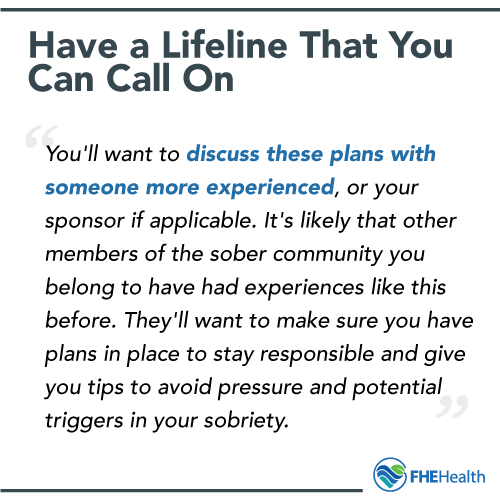 Ideally, in your recovery, you’ve become part of some sort of sober community. Whether this takes the form of a support group or a 12-step program like AA or NA, it’s important to have people you can lean on who understand where you’ve been and where you will be.
Ideally, in your recovery, you’ve become part of some sort of sober community. Whether this takes the form of a support group or a 12-step program like AA or NA, it’s important to have people you can lean on who understand where you’ve been and where you will be.
This is especially important if this is your first outing after getting sober. In this case, you’ll want to discuss these plans with someone more experienced, or your sponsor if applicable. It’s likely that other members of the sober community you belong to have had experiences like this before. They’ll want to make sure you have plans in place to stay responsible and give you tips to avoid pressure and potential triggers in your sobriety.
Another strategy you can use to lean on your support system is to arrange check-ins over the course of the night. Have your sponsor or a more experienced member on call so you can check in, provide progress reports and talk about anything you may need to handle with the advice of someone you trust to keep you in line with your own best interests as a recovering substance abuser.
Here’s a breakdown of the different support groups available to those in recovery, before, during and after rehab.
Resist Peer Pressure
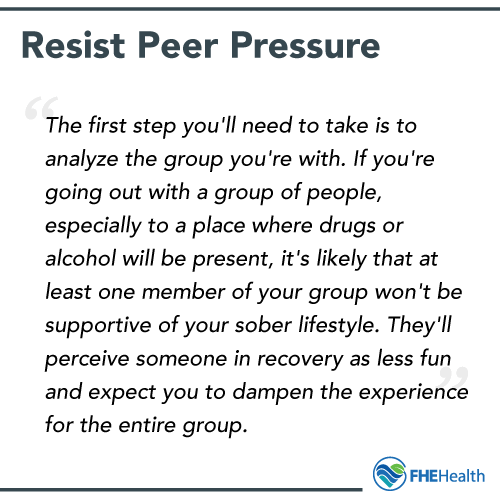 Staying sober when your friends drink or use drugs is one of the hardest experiences for recovering addicts to deal with. Not everyone completely turns their back on their social circle when they go into recovery; how do you stay sober among all these social influences to use?
Staying sober when your friends drink or use drugs is one of the hardest experiences for recovering addicts to deal with. Not everyone completely turns their back on their social circle when they go into recovery; how do you stay sober among all these social influences to use?
The first step you’ll need to take is to analyze the group you’re with. Studies show that peer pressure can be a strong influence, but so can peer support. If you’re going out with a group of people, especially to a place where drugs or alcohol will be present, it’s likely that at least one member of your group won’t be supportive of your sober lifestyle. They’ll perceive someone in recovery as less fun and expect you to dampen the experience for the entire group.
If you find that nearly an entire peer group is this way, it may be worth considering whether these people are even your friends at all. Real friends will support you and have your best interests in mind.
Even in a mixed group, if you suspect that someone will try to pressure you into “just one drink” or using “just this once,” it’s better to be safe than sorry. If you have doubts about your ability to overcome pressure like this, make sure you have one person in your corner watching out for you or make the choice to sit this one out.
Don’t Underestimate Your Process
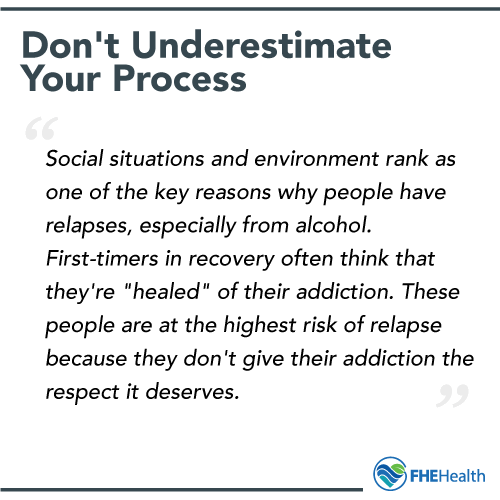 Something that tends to happen when someone is in recovery is focusing on how far you’ve come. Even the longest inpatient rehab programs are a comparatively small amount of time when viewed next to the rest of your life. Addiction is a disease, and it’s easy to underestimate for newly sober patients.
Something that tends to happen when someone is in recovery is focusing on how far you’ve come. Even the longest inpatient rehab programs are a comparatively small amount of time when viewed next to the rest of your life. Addiction is a disease, and it’s easy to underestimate for newly sober patients.
Social situations and environment rank as one of the key reasons why people have relapses, especially from alcohol. First-timers in recovery often think that they’re “healed” of their addiction. These people are at the highest risk of relapse because they don’t give their addiction the respect it deserves.
This is something to acknowledge before you go out with friends during recovery. Understand that there will be pressure, and you may never be as close to some of your personal triggers as you will be in a bar, or even at a party.
Something that many addicts admit about going out in recovery is that they get that voice in the back of their head that says if they have one drink they can control themselves, or if they use just this once they won’t slip back into their bad habits. Give your disease the respect it deserves: One time can be all you need to slip back into the depths of addiction.
Going Out While Staying Sober: It’s Not Easy
There’s no reason to sugarcoat the fact that certain things you enjoyed doing before or during your addiction will not be the same during recovery. Going out and having a social life will be one of these things, and it may be difficult to resist the temptations and peer pressure for the rest of your life.
The important thing to remember is that recovery doesn’t mean you have to stop living. With the right preparation, you can maintain an active social life without sacrificing your sobriety.






